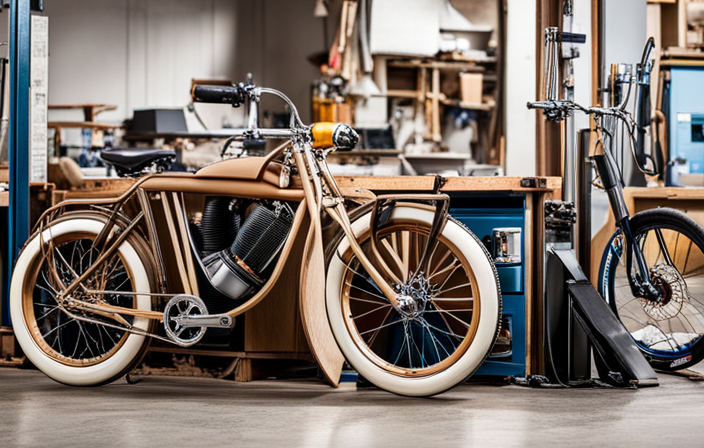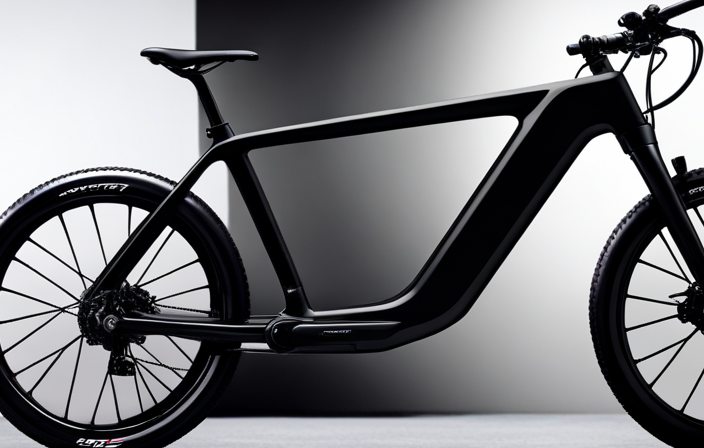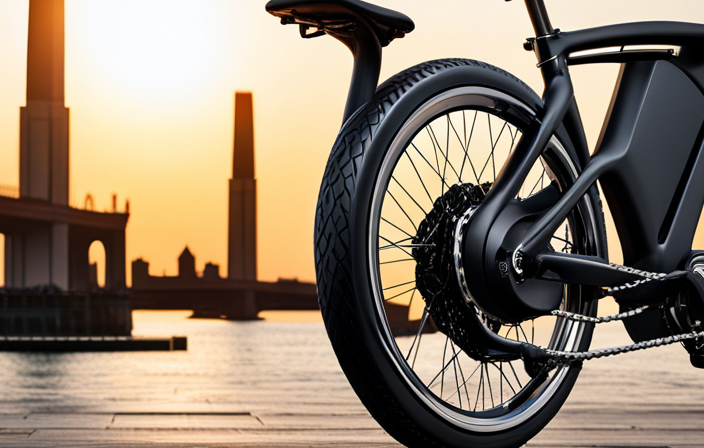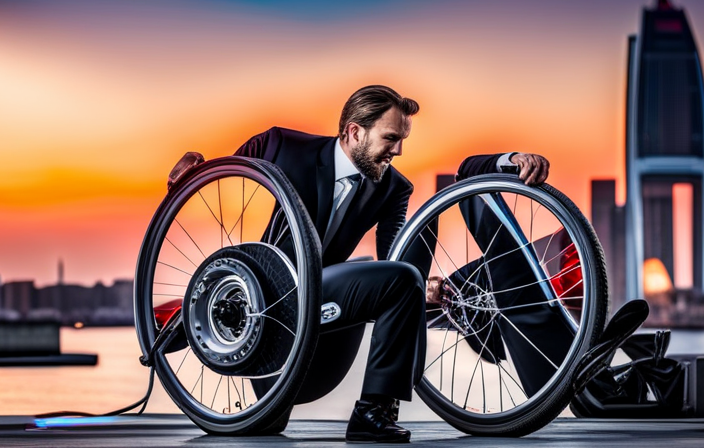Did you know that converting your bike to electric can be a cost-effective alternative to buying a brand new electric bike?
In fact, it is estimated that the average cost to convert a bike to electric ranges from $500 to $1,500. With the right components, research, and planning, you can transform your ordinary bike into a powerful and eco-friendly mode of transportation.
In this article, we will dive into the details of how much it truly costs to convert your bike to electric and explore the various factors to consider in making this conversion.
Key Takeaways
- Converting a bike to electric can cost anywhere from $500 to $1500 on average.
- The components needed for conversion include batteries, motor, and controller, with prices varying based on quality and brand.
- Battery selection is crucial and options include lithium-ion or lead-acid batteries, with prices ranging from $200 to $1200.
- The decision to DIY or opt for professional conversion should be based on skills, time availability, desired quality, and budget.
Components Needed for Electric Conversion
You’ll need a few components to convert your bike to electric. First, let’s talk about cost estimation.
The price of converting your bike to electric can vary depending on the quality and brand of the components you choose. On average, you can expect to spend around $500 to $1500 for a complete conversion kit.
Now, let’s move on to battery selection. The battery is a crucial component that determines the range of your electric bike. There are various options available, such as lithium-ion or lead-acid batteries, each with its own pros and cons. Consider factors like weight, capacity, and price when selecting the right battery for your needs.
With these components in mind, let’s dive into the cost breakdown of converting your bike to electric.
Cost Breakdown
When considering the cost breakdown of converting your bike to electric, it’s important to take into account the price range of components, additional costs for installation, and ongoing maintenance and upkeep expenses.
The price range of components can vary depending on the quality and brand, with options ranging from budget-friendly to higher-end options.
Additionally, you’ll need to factor in the cost of installation, which can vary depending on whether you choose to do it yourself or hire a professional.
Lastly, it’s important to consider the ongoing maintenance and upkeep expenses, such as battery replacements and regular servicing, to ensure your electric bike continues to run smoothly.
Price Range of Components
To convert your bike to electric, you can expect to find a price range for the components. The cost of batteries is a significant factor in determining the overall price of the conversion. When comparing prices, it is essential to consider the quality and capacity of the batteries. Lower-priced batteries may not last as long or provide the same level of performance as higher-priced ones. Additionally, other components such as the motor, controller, and wiring will also contribute to the overall cost. To give you an idea of the price range, here is a table showcasing three different options for each component:
| Component | Low Price Range ($) | High Price Range ($) |
|---|---|---|
| Batteries | 200-400 | 800-1200 |
| Motor | 200-400 | 800-1200 |
| Controller | 100-200 | 400-600 |
Considering these prices, it is important to budget for additional costs for installation.
Additional Costs for Installation
Don’t forget to factor in additional costs for installation when budgeting for your electric bike conversion.
Along with the price of the components, you also need to consider the cost of batteries and warranty coverage. The cost of batteries can vary depending on the type and capacity you choose. Lithium-ion batteries, which are commonly used in electric bike conversions, can range from $200 to $800. It’s important to invest in a quality battery that can provide sufficient power and longevity for your electric bike.
Additionally, warranty coverage is essential to protect your investment. Some battery manufacturers offer warranties ranging from 6 months to 2 years, so be sure to check the terms and conditions.
Once you’ve accounted for these additional costs, you can move on to considering maintenance and upkeep expenses for your electric bike.
Maintenance and Upkeep Expenses
Make sure you factor in the ongoing costs of maintaining and keeping up your electric bike. While the initial conversion may seem like a significant investment, it’s essential to consider the long-term savings and environmental impact.
Here are three key expenses to keep in mind:
-
Battery Replacement: Electric bike batteries typically last between 2-5 years, depending on usage and quality. Budget for the cost of a new battery, which can range from $300 to $800, depending on the brand and capacity.
-
Regular Servicing: Like any vehicle, electric bikes require regular servicing to ensure optimal performance. This may include brake adjustments, tire replacements, and general maintenance. Factor in the cost of routine servicing, which can range from $50 to $150 per year.
-
Upgrades and Accessories: As technology advances, you may want to upgrade or add accessories to your electric bike. This could include things like a more powerful motor, upgraded lights, or a more comfortable seat. Consider the cost of these potential upgrades in your overall budget.
Considering these ongoing expenses will help you plan for the long-term maintenance and upkeep of your electric bike.
Now let’s dive into the next section: DIY vs. professional conversion.
DIY vs. Professional Conversion
Choosing between a DIY or professional conversion is a decision that should be carefully considered when converting a bike to electric.
If you have the necessary DIY skills and expertise, opting for a DIY conversion can save you money and provide a sense of accomplishment. However, it’s important to note that converting a bike to electric requires knowledge of electrical systems and mechanical components.
On the other hand, professional conversion offers the advantage of relying on experts who have experience in electric bike conversions. They can ensure a higher level of quality and reliability, especially if you lack the necessary skills or time. Additionally, professional conversion kits often come with warranties and ongoing support.
Ultimately, the choice between DIY and professional conversion depends on your expertise, time availability, and desired level of quality. Before making a decision, it’s important to thoroughly research and plan your conversion to ensure a successful outcome.
Research and Planning
Before embarking on an electric bike conversion project, it’s crucial to thoroughly research and plan out the process. To ensure the success of your conversion, here are some key steps to consider:
-
Finding reliable conversion kit suppliers: It’s essential to source your conversion kit from reputable suppliers who offer high-quality products and good customer support. Look for reviews and recommendations from other electric bike enthusiasts to make an informed decision.
-
Exploring different battery options: The battery is a vital component of your electric bike conversion. Research and compare different battery types, such as lithium-ion or lead-acid, to find the one that best suits your needs in terms of capacity, weight, and durability.
-
Assessing your bike’s compatibility: Not all bikes are suitable for electric conversions. Take the time to evaluate your bike’s frame, brakes, and other components to ensure they can handle the additional weight and power of an electric motor.
By thoroughly researching and planning your electric bike conversion, you can confidently move on to choosing the right conversion kit for your needs.
Choose the Right Conversion Kit
To ensure a successful conversion, it’s important for you to select the appropriate conversion kit for your specific needs and preferences. When it comes to conversion kit options, there are several factors to consider.
One of the main decisions is whether to go with a front wheel, rear wheel, or mid-drive kit. Each option has its pros and cons. A front wheel kit is the easiest to install but may affect the bike’s balance. A rear wheel kit provides better traction but can be more challenging to install. A mid-drive kit offers a more natural riding experience but tends to be more expensive.
Additionally, you’ll need to consider battery capacity, motor power, and compatibility with your bike. With the right conversion kit, you can transform your bike into an efficient and eco-friendly electric ride.
Now, let’s move on to the tools and skills required for the conversion process.
Tools and Skills Required
One important aspect of the conversion process is having the necessary tools and skills. To successfully convert your bike to electric, you will need the following tools:
- A wrench set: This will be essential for removing and tightening bolts throughout the conversion process.
- Wire cutters: These will come in handy when you need to trim or strip wires during the electrical connections.
- A multimeter: This tool will allow you to measure voltage, current, and resistance, ensuring proper electrical connections.
In addition to the tools, you will also need some required skills. Basic mechanical skills are necessary to disassemble and reassemble certain parts of the bike. Familiarity with electrical systems and wiring is also important to ensure a safe and efficient conversion.
With the right tools and skills, you will be ready to move on to the installation process, where you will bring your electric bike to life.
Installation Process
Now that you have the necessary tools and skills, it’s time to start the installation process for your electric bike.
The installation time can vary depending on your experience and the complexity of the conversion kit you have chosen. On average, it can take anywhere from a couple of hours to a full day to complete the installation.
Before you begin, it’s important to read and follow the instructions provided by the manufacturer carefully. This will help you avoid any potential challenges that may arise during the process. Some common challenges include aligning the motor correctly, connecting the wires properly, and ensuring that all components are securely fastened.
Once the installation is complete, you can move on to the next section where we will discuss the legal and safety considerations you need to keep in mind.
Legal and Safety Considerations
Before you start the installation process, it’s important to be aware of the legal and safety considerations involved in converting your bike to electric. Electric bike regulations vary by country and even by state, so it’s crucial to familiarize yourself with the laws in your area. Some common regulations include speed limits, age restrictions, and the requirement for a valid driver’s license or insurance. Additionally, safety guidelines should be followed to ensure a smooth and secure electric conversion. This includes wearing a helmet, using appropriate lighting and reflectors, and following traffic rules. To give you a better understanding, here is a table summarizing some key regulations and safety guidelines you should keep in mind:
| Regulation | Description |
|---|---|
| Speed Limits | Maximum speed allowed for electric bikes |
| Age Restrictions | Minimum age requirement for riding an electric bike |
| Licensing and Insurance | Whether a driver’s license or insurance is necessary for riding an electric bike |
| Safety Equipment | Required safety gear such as helmets and lights |
Knowing these legal and safety considerations will help ensure a successful electric conversion. Now, let’s explore the benefits of converting your bike to electric.
Benefits of Electric Conversion
To fully understand the advantages of going electric, you’ll be pleased to discover the numerous benefits that come with converting your bicycle. Here are some of the key benefits of converting your bike to electric:
-
Cost Comparison: Converting your bike to electric is a cost-effective alternative to buying a new electric bike. The conversion kits are generally more affordable, allowing you to enjoy the benefits of an electric bike without breaking the bank.
-
Environmental Impact: By converting your bike to electric, you’re making a positive impact on the environment. Electric bikes produce zero emissions, reducing air pollution and contributing to a cleaner and greener planet.
-
Increased Range: Electric conversion allows you to enjoy longer rides without worrying about running out of power. With a larger battery capacity, you can explore more areas and go on adventures without limitations.
-
Health Benefits: Electric bikes still require pedaling, providing you with the opportunity to engage in physical activity and improve your fitness level while enjoying the assistance of the electric motor.
In conclusion, converting your bike to electric offers numerous benefits such as cost savings, environmental friendliness, extended range, and improved health. It’s a worthwhile investment that enhances your cycling experience.
Conclusion and Final Thoughts
You should consider converting your bicycle to electric because it offers a range of benefits and enhances your overall cycling experience. Converting your bike to electric has both pros and cons. On the positive side, it allows you to ride longer distances without getting tired, especially when going uphill. It also provides a boost of power when you need it the most, such as during a long ride or when carrying heavy loads. Additionally, electric bikes are more environmentally friendly compared to cars and motorcycles. However, there are a few drawbacks to consider. Electric bike conversions can be expensive, depending on the quality and components used. Maintenance and battery replacement can also be costly in the long run. It’s important to keep these factors in mind before making the decision to convert your bike. In my personal experience, converting my bike to electric has been a game-changer. It has allowed me to explore new routes and push my limits without feeling exhausted. The added power and convenience have made my cycling adventures more enjoyable and accessible. Overall, I highly recommend considering electric conversion for your bike, but make sure to weigh the pros and cons based on your personal preferences and budget.
| Pros | Cons |
|---|---|
| Extended range | Costly conversion |
| Power assistance | Expensive maintenance |
| Environmentally friendly | Battery replacement |
| Improved accessibility |
Frequently Asked Questions
Are there any specific regulations or laws regarding electric bike conversions that I should be aware of?
When it comes to electric bike conversions, it’s important to be aware of specific regulations and laws. These may vary depending on your location, but they often cover areas such as speed limits, safety requirements, and the use of certain components.
How long does it typically take to convert a bike to electric?
Converting a bike to electric typically takes a few hours to a couple of days, depending on your experience and the complexity of the conversion. The cost of conversion can vary depending on the quality of components you choose.
Can any type of bike be converted to electric, or are there certain models that work best?
Certain models work best for electric bike conversions. For example, mountain bikes with sturdy frames and good suspension are ideal. The advantages of converting a bike to electric include increased speed, longer range, and reduced effort while pedaling.
Are there different types of electric conversion kits available, and if so, how do I choose the right one for my needs?
When choosing an electric conversion kit, consider factors like your budget, desired range, and power. There are various types of kits available, such as front wheel, rear wheel, and mid-drive. Each has its pros and cons, so research thoroughly before making a decision.
What kind of maintenance or repairs should I expect with an electric bike conversion?
Maintenance and repair costs for electric bike conversions can vary depending on the quality of components used. Common issues include battery replacements, motor malfunctions, and wiring problems. Regular maintenance such as checking tire pressure and cleaning the bike is also important.
Conclusion
So, you’ve made it to the end of this comprehensive guide on converting your bike to electric. Congratulations! By now, you should have a good understanding of the components needed, the cost breakdown, and the DIY vs. professional conversion options.
Remember, knowledge is power! Just like the power you’ll feel when riding your newly converted electric bike. So, whether you choose to embark on this journey yourself or seek professional help, always prioritize safety and legal considerations.
Now, go forth and electrify your ride!









